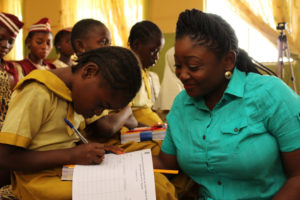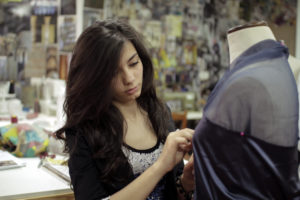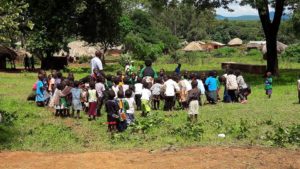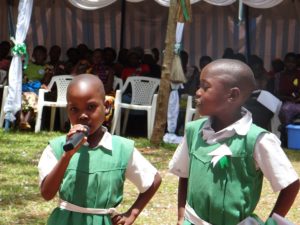A Safe Haven – and a New Future – for Trafficked Girls
Child and Youth Protection Foundation / Abuja, Nigeria
In Nigeria, hundreds of thousands of children work instead of going to school. Child domestic servants—predominantly girls who are trafficked from rural areas—are denied an education and are particularly at risk of experiencing sexual violence and abuse.
 For this extremely vulnerable population, Child and Youth Protection Foundation (CYPF) offers a safe haven. The organization rescues and provides holistic support to girls who have been trafficked from rural areas to work as domestic laborers in the capital city of Abuja, helping them to overcome challenges and build lives of hope and opportunity.
For this extremely vulnerable population, Child and Youth Protection Foundation (CYPF) offers a safe haven. The organization rescues and provides holistic support to girls who have been trafficked from rural areas to work as domestic laborers in the capital city of Abuja, helping them to overcome challenges and build lives of hope and opportunity.
CYPF’s strategy involves a combination of formal education and counseling, with after-school tutoring and additional counseling sessions for girls who need extra support. When a girl lacks safe shelter, CYPF connects her to its network of social resources and continues to regularly monitor her well-being.
Community relationships are key to building a support network for these girls: CYPF coordinates with the girls’ families, other community members, youth groups, and faith leaders to ensure that these stakeholders are collectively meeting each girl’s needs. When the entire community is invested in a girl’s safety and education, her potential knows no limits.
Tapping into Youth Talent in Lebanon
Nawaya Network / Beirut, Lebanon
Greater Beirut hosts 30% of Lebanon’s 1.5 million refugees, half of whom are children and youth. Coming from Syria, Iraq, and elsewhere, most families settle in Beirut’s shantytowns, where there are high levels of crime and violence. Resources are scarce, and social services are virtuallyinaccessible to the many refugees who lack legal status. Youth struggle to gain a foothold in the economy and are left with few options for supporting themselves; many end up living or working on the streets to survive.

Nawaya Network sees unemployed young people not as a burden to society but as an untapped resource. Working with both refugees and disadvantaged Lebanese youth, Nawaya Network connects young people to financial and educational resources so they can build their skills and start on the path toward economic stability.
The organization offers three youth empowerment programs: the Impact Lab, the SE Factory, and the Talent Program. The Impact Lab is a business development training program that helps unemployed youth develop innovative income-generating solutions to problems in their own communities. The SE Factory equips youth with specialized computer science skills (and boasts a 90% employment rate for graduates), and the Talent Program connects promising youth from low-income backgrounds to resources such as mentors, trainers, classes, funding, internships, and job opportunities.
The result: young people move from life on the streets into higher education and employment – proving that when given the chance, they have much to contribute to making our world a better place.
A Healthy Start Limits the Impact of Poverty and HIV
Kachere Development Programme / Chipata, Zambia
More than half of the people in Zambia’s Chipata District live in extreme poverty, lacking sufficient food and clean drinking water—let alone access to education. One in six children has lost a parent to AIDS (twice the national average), and child marriage and abandonment are common. In a community that faces so many challenges, children struggle to get a healthy start in life.
 In response to these challenges, Kachere Development Programme (KDP) provides education and care to young children, while also supporting their families, many of whom are affected by HIV/AIDS. By establishing community-based early childhood development programs, KDP creates opportunities for children to come together to learn, play, receive healthcare and nutritional support, and ultimately transition to primary school.
In response to these challenges, Kachere Development Programme (KDP) provides education and care to young children, while also supporting their families, many of whom are affected by HIV/AIDS. By establishing community-based early childhood development programs, KDP creates opportunities for children to come together to learn, play, receive healthcare and nutritional support, and ultimately transition to primary school.
The children’s groups also serve as an entry point for providing holistic family support: KDP helps parents build entrepreneurial skills and start their own small businesses, which makes it easier for them to support their children’s education. KDP also conducts outreach in the community and in schools, educating children and adults about HIV/AIDS prevention and care and working to reduce the stigma associated with the disease.
And KDP doesn’t stop there: the organization also rescues girls who have been forced into early marriages, refers them to shelters, and connects them with opportunities to go to school or learn livelihood skills. For the Chipata community, KDP is truly a lifeline of support.
Education and Hope for Girls in Rural Kenya
Girls Leading Our World Initiatives / Kisumu, Kenya
The drive from Nairobi to the rural girls’ school run by Girls Leading Our World Initiatives (iGLOW) in Ukwala takes nine hours over rough terrain. But despite the community’s isolation, as soon as you arrive at the school, you can feel the energy and can sense just how much the girls are thriving here.
 Focused on extremely vulnerable girls in rural Kenya, iGLOW removes barriers that commonly prevent girls from going to school. Most of these girls have been rescued from forced marriages or from sexual abuse, and many come from single-parent households or have been affected by HIV/AIDS.
Focused on extremely vulnerable girls in rural Kenya, iGLOW removes barriers that commonly prevent girls from going to school. Most of these girls have been rescued from forced marriages or from sexual abuse, and many come from single-parent households or have been affected by HIV/AIDS.
iGLOW’s process begins with counseling for both the girls and their families, school placement, and teacher orientation. Leadership training, mentoring, and tutoring build the girls’ self-esteem and accelerate their learning. Meanwhile, healthcare services and reproductive health education improve the girls’ overall well-being and teach them how to protect their bodies and their rights.
iGLOW demonstrates that girls who have faced extreme hardship can become leaders who work at the forefront of social change. But it’s our job to make sure they have the opportunity to do so.